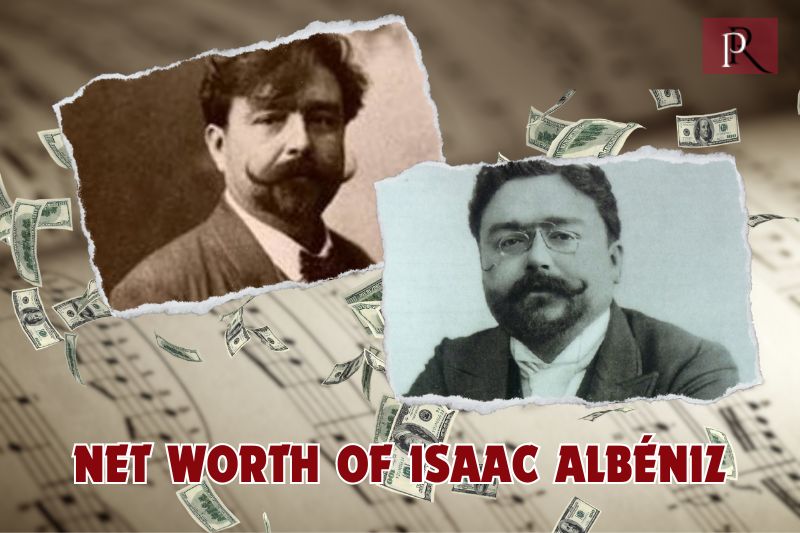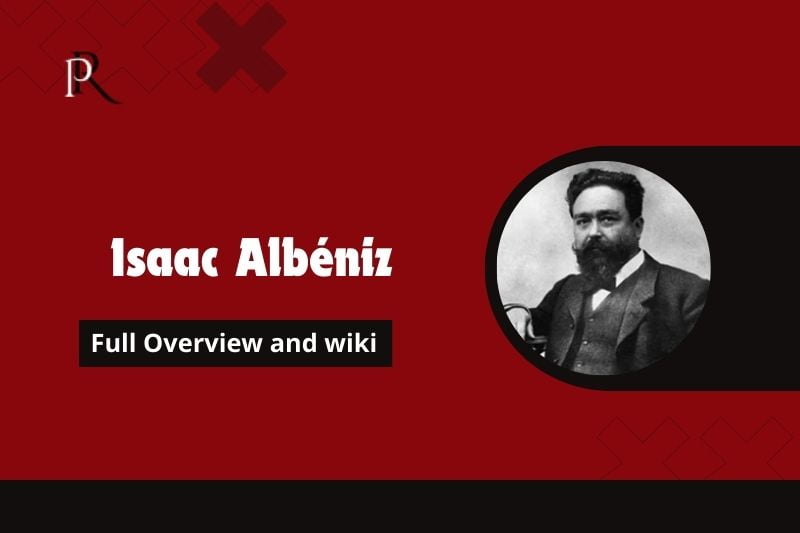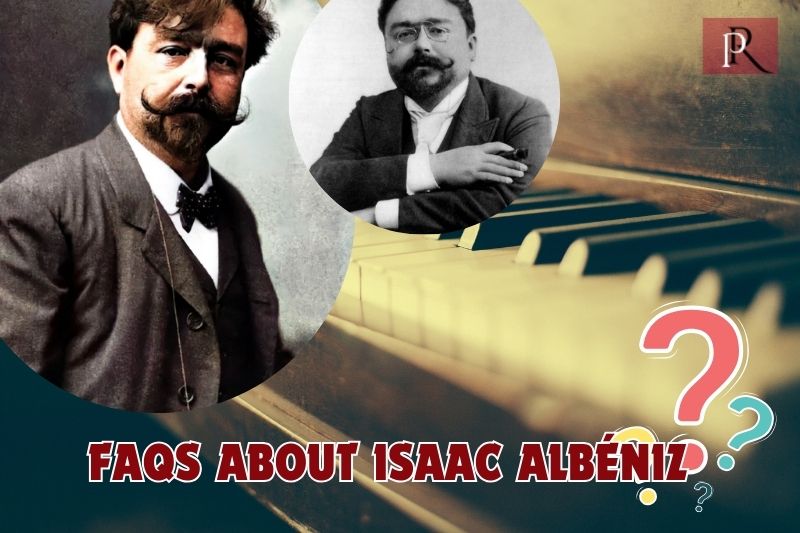Isaac Albéniz, a famous Spanish pianist and composer, left a notable legacy in classical music.
In this article, we will find out Isaac Albéniz net worthreflects on his contributions to music and how they have transcended time, offering perspective on the financial aspects of his illustrious career.
Quick information
| Real name | Isaac Manuel Francisco Albéniz and Pascual |
| Popular name | Isaac Albeniz |
| Sex | male |
| Date of birth | May 29, 1860 |
| Age at death | 48 years |
| Parents | Ángel Albéniz and Dolors Pascual |
| Siblings | do not apply |
| Place of birth | Camprodon, Catalonia, Spain |
| Nationality | Spanish |
| Nation | Catalan |
| Education | Paris Conservatory of Music |
| Marital status | Married |
| Sexual orientation | heterosexual |
| Wife/Wife/husband | Rosina Jordana Lagarriga |
| Children | Alfonso Albéniz, Laura Albéniz, Enriqueta Albéniz (died in infancy) |
| Dating | do not apply |
| Net value | do not apply |
| Origin of wealth | Music, Composition |
| Category | Classical music, Spanish folk music |
| Height | do not apply |
What is Isaac Albéniz’s net worth in 2024?

When discussing historical figures like Isaac Albéniz, it is interesting to speculate about their financial status if they lived today.
Albéniz, a well-known figure in classical music, unfortunately did not have a calculable net worth like that of contemporary musicians due to the era in which he lived.
However, compare his influence and output with peers such as Francisco Tarrega, Alicia de Larrocha, Manuel de FallaAnd Enrique GranadosAlbéniz’s contributions to music were enormous.
His extensive touring and successful compositions may have resulted in considerable wealth, potentially putting him on par with figures such as Larrocha and Granados in terms of financial success.
Isaac Albéniz Full overview and Wiki

Isaac Albéniz, whose name is synonymous with Spanish classical music, was more than just a composer; he was a visionary who painted the soulful landscapes of Spain through his piano. His journey to his musical heart started extremely early.
Recognized as a prodigious talent at just four years old, Albéniz’s early life was marked by a rapid rise in the field of classical music, fueled by passion and talent beyond measure. Denial helped him perform across continents before reaching adulthood.
Early life and musical beginnings
Born in the small town of Camprodon in Catalonia, Spain, Albéniz was brought into the musical limelight by his father, a customs official who recognized his son’s talent.
His extraordinary nature brought him to fame Paris Conservatory of Musicalthough he was initially denied admission due to his young age.
This initial failure did not discourage him; it only motivated him to push the boundaries of his musical ambitions even further.
The influence of Spanish folk music on Albéniz’s compositions
Under the guidance of Felip Pedrell, Albéniz began weaving the vibrant threads of Spanish folk music into the classical fabric, changing the landscape of European music.
His compositions rich in the quintessence of Spanish culture began to resonate more deeply with the spirit of the people and land he loved so much.
His masterpieces such as Spanish Suite And Iberia not only brought fame to Albéniz but also painted an auditory picture of Spain’s diverse regions.
From Suite Española to Iberia
These works, often highly praised in concert reviews by classical pianists, demonstrated Albéniz’s unique ability to combine technical prowess with profound cultural expression. .
Iberia, for example, is a collection that demonstrates his creative integration of the complex rhythms and melodies that echo in the streets and festivals of Spanish towns.
Albéniz’s contributions to Guitar music
Although a pianist, Albéniz’s music has earned the respect of classical guitarists, thanks to his transcriptions. Francisco Tarrega.
His piano pieces, especially Asturias (Leyenda)has become one of the most beloved acts in classical guitar, demonstrating his posthumous influence on an instrument he never explicitly composed.
Albéniz’s global impact and relationship with contemporary composers
His music not only influenced contemporaries such as Debussy and Ravel but also set a precedent for integrating ethnic elements into classical music, promoting greater acceptance and appreciation of the art. Spanish music globally.
Legacy and Recognition: Awards and Posthumous Tributes
Even after his death, Albéniz’s music continued to receive many awards and was celebrated worldwide, his works serving as a bridge between traditional Spanish and Spanish sounds. Modern musical innovation.
Personal life
Isaac Albéniz had a life as colorful as his compositions. Married to Rosina Jordana, he is not only a devoted husband but also a father of three children.
His personal life, with its travels and performances, is as dynamic as his music, always filled with love for his Spanish roots and a passion to bring this culture to global stage.
Social Media
do not apply
Frequently asked questions about Isaac Albéniz

What is Isaac Albéniz known for?
Albéniz is celebrated for his piano compositions that incorporate elements of Spanish folk music, making significant contributions to the classical guitar repertoire.
When and where was Isaac Albéniz born?
He was born on May 29, 1860 in Camprodón, Spain.
Have you received any notable awards during your life?
That’s right, Albéniz was awarded the Grand-Croix de la Légion d’honneur by the French government shortly before his death.
What is one of Isaac Albéniz’s most famous works?
One of his most famous works is Asturias (Leyenda), a work originally written for piano but often played on classical guitar.
How did he contribute to musical nationalism?
Albéniz used musical ideas or motifs associated with Spain, such as folk melodies, rhythms, and harmonies, contributing to the movement of musical nationalism.
Where did he spend important parts of his career?
During the 1890s, Albéniz lived in London and Paris, where he composed and gained recognition for his work.
At what age did he begin his concert career?
Albéniz began his concert career at the age of nine, touring northern Spain with his father and sister.
What was the last work composed by Isaac Albéniz?
His last composition was Iberia, a suite of 12 piano pieces, completed late in his life.
How has Albéniz’s music been posthumously adapted?
After his death, many of Albéniz’s works were transcribed for other instruments, popularizing Spanish melodies across a variety of musical formats.
When did he die?
He died on May 18, 1909 in Cambo-les-Bains, France.
Conclusion
In short, Albéniz’s net worth tells the story of talent turning into timeless wealth. His music not only enriched the artistic scene but also enriched his financial portfolio, illustrating the lasting value of cultural contributions.
Check out https://rachelparris.com/ for more articles like this!
Categories: Musician
Source: svlsf.edu.vn
